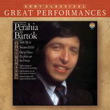This reissue -- Great Performances: Murray Perahia Performs Béla Bartók -- supplements a  1981 solo LP (of 1973, '76, and '80 recordings) with another Bartok piece from a 1988 album; Bartok Piano Works thus puts all of Murray Perahia's recordings of the composer's work on a single disc. Perahia has recorded surprisingly little modern music compared to other currently active superstar pianists (this stuff plus the Berg Sonata is about it), but he sounds perfectly at home in this repertoire. The Piano Sonata sounds like the masterpiece it is, simultaneously primitive and modern in its rhythmic ferocity and harmonic dissonance. Hearing Perahia put all his technique and interpretive taste at the service of the relatively obscure Improvisations on Hungarian Peasant Songs - much more complex and unfolkish than the title suggests -- it too sounds like a great work. The little four-movement Suite, Op. 14, is charming. The other acknowledged solo masterpiece here, Out of Doors, alternates power and seductiveness. "With Drums and Pipes" thunders brilliantly; "Barcarolla" is positively erotic; "Musettes" (depicting bagpipe drones) shifts moods mercurially in teasing, playful fashion; the mysterious "Musiques Nocturnes" shimmers delicately and impressionistically; the dramatic closing movement "The Chase" is thrilling without being one-dimensional or overbearing.
1981 solo LP (of 1973, '76, and '80 recordings) with another Bartok piece from a 1988 album; Bartok Piano Works thus puts all of Murray Perahia's recordings of the composer's work on a single disc. Perahia has recorded surprisingly little modern music compared to other currently active superstar pianists (this stuff plus the Berg Sonata is about it), but he sounds perfectly at home in this repertoire. The Piano Sonata sounds like the masterpiece it is, simultaneously primitive and modern in its rhythmic ferocity and harmonic dissonance. Hearing Perahia put all his technique and interpretive taste at the service of the relatively obscure Improvisations on Hungarian Peasant Songs - much more complex and unfolkish than the title suggests -- it too sounds like a great work. The little four-movement Suite, Op. 14, is charming. The other acknowledged solo masterpiece here, Out of Doors, alternates power and seductiveness. "With Drums and Pipes" thunders brilliantly; "Barcarolla" is positively erotic; "Musettes" (depicting bagpipe drones) shifts moods mercurially in teasing, playful fashion; the mysterious "Musiques Nocturnes" shimmers delicately and impressionistically; the dramatic closing movement "The Chase" is thrilling without being one-dimensional or overbearing.
Perahia's playing in the above pieces is less clangorous and percussive than his competition's (thanks be given, as these works are inherently percussive enough that banging is overkill). The harmonies seem more piquant as a result, and the lyricism in the slower pieces is never slighted. But the drive of the Eastern European rhythms Bartok took from the folk music he loved and researched so extensively loses no acuity in Perahia's hands. The engineering offers a close perspective and dry sound in the solo works, but the beauty of Perahia's tone -- a beauty rarely heard from other Bartók players -- still shines through. The dynamic range could be wider, but the close miking presumably made louder playing impractical and softer playing impossible.
For the later recording of the mighty Sonata for Two Pianos and Percussion, Perahia is joined by Sir Georg Solti on piano (taking a holiday from his usual conducting gig and proving fairly adept as a player) and percussionists David Corkhill and Evelyn Glennie. The coordination between the pianists, though generally fine, has a few ragged moments in the first movement, though nothing comes unhinged in a work notoriously difficult to keep together; it helps that the outer movements are less frenetic in tempo than in many performances, though that takes a toll in excitement. Sonically there are some odd perspective shifts (the pianos seem to trade sides) and the piercing xylophones are overly prominent -- but this is also a piece famously challenging to balance. It's unfortunate that the last item is not quite up to the standard of the solo pieces, but on a mid-price CD such as this, the first 47 minutes of impeccable pianism are enough to justify its acquisition, just as when they made up a stand-alone LP. Think of the Sonata for Two Pianos and Percussion as a long bonus.
